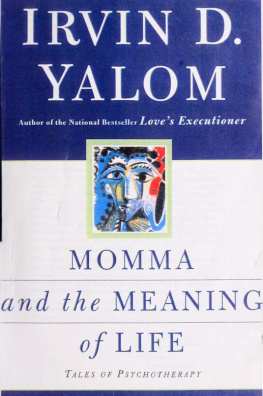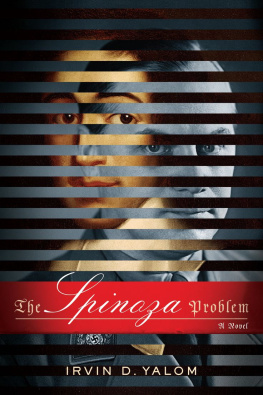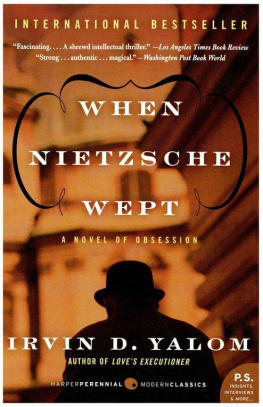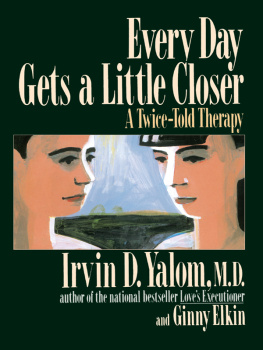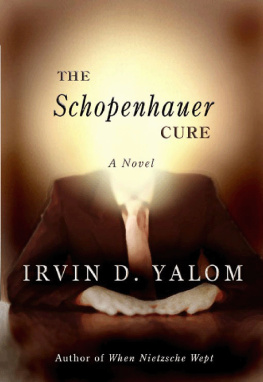Irvin D. Yalom - Existential Psychotherapy
Here you can read online Irvin D. Yalom - Existential Psychotherapy full text of the book (entire story) in english for free. Download pdf and epub, get meaning, cover and reviews about this ebook. year: 2020, publisher: Basic Books, genre: Romance novel. Description of the work, (preface) as well as reviews are available. Best literature library LitArk.com created for fans of good reading and offers a wide selection of genres:
Romance novel
Science fiction
Adventure
Detective
Science
History
Home and family
Prose
Art
Politics
Computer
Non-fiction
Religion
Business
Children
Humor
Choose a favorite category and find really read worthwhile books. Enjoy immersion in the world of imagination, feel the emotions of the characters or learn something new for yourself, make an fascinating discovery.

- Book:Existential Psychotherapy
- Author:
- Publisher:Basic Books
- Genre:
- Year:2020
- Rating:3 / 5
- Favourites:Add to favourites
- Your mark:
- 60
- 1
- 2
- 3
- 4
- 5
Existential Psychotherapy: summary, description and annotation
We offer to read an annotation, description, summary or preface (depends on what the author of the book "Existential Psychotherapy" wrote himself). If you haven't found the necessary information about the book — write in the comments, we will try to find it.
Existential Psychotherapy — read online for free the complete book (whole text) full work
Below is the text of the book, divided by pages. System saving the place of the last page read, allows you to conveniently read the book "Existential Psychotherapy" online for free, without having to search again every time where you left off. Put a bookmark, and you can go to the page where you finished reading at any time.
Font size:
Interval:
Bookmark:
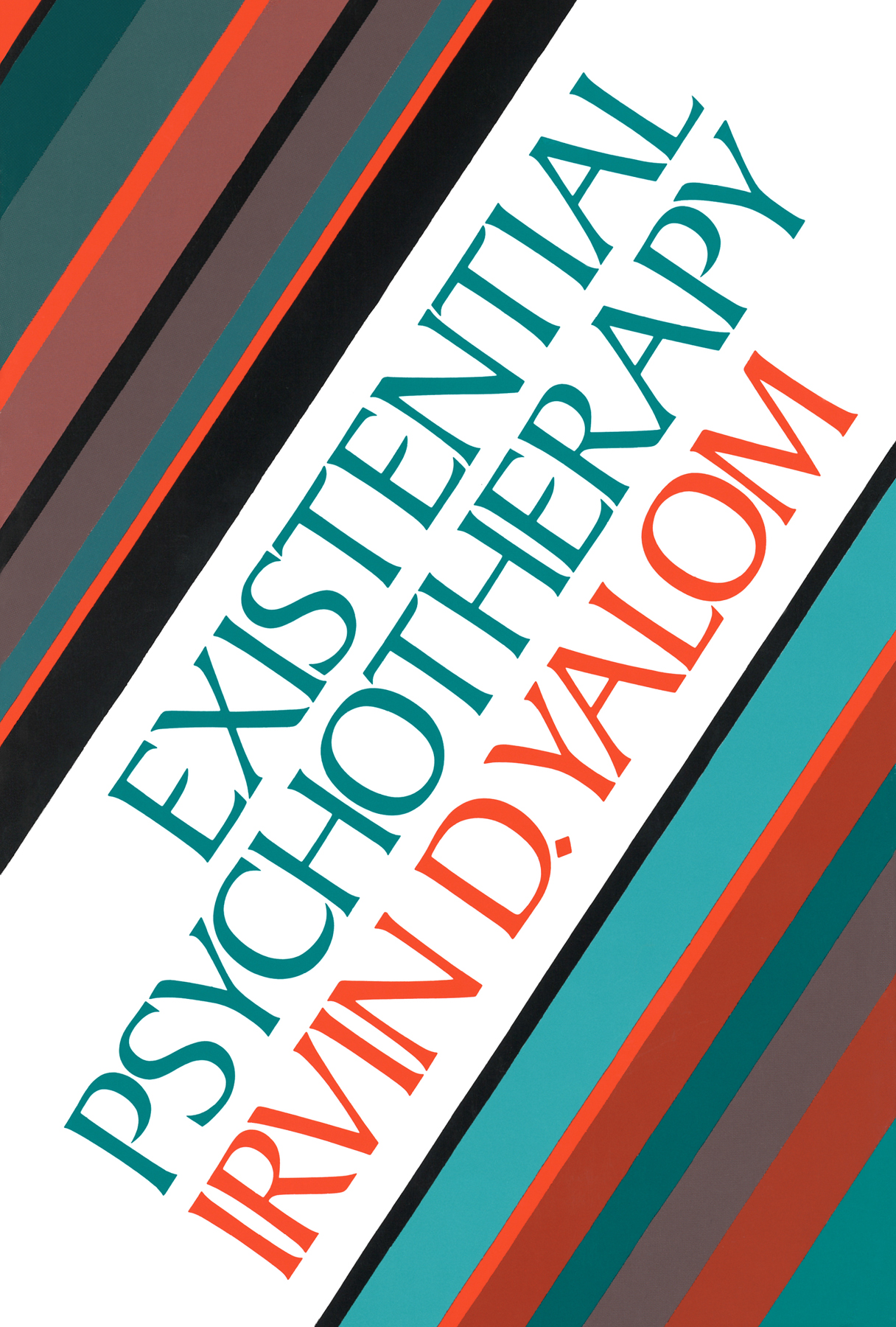
Copyright 1980 by Yalom Family Trust
Cover design by Vincent Torre
Cover copyright 1980 Hachette Book Group, Inc.
Hachette Book Group supports the right to free expression and the value of copyright. The purpose of copyright is to encourage writers and artists to produce the creative works that enrich our culture.
The scanning, uploading, and distribution of this book without permission is a theft of the authors intellectual property. If you would like permission to use material from the book (other than for review purposes), please contact permissions@hbgusa.com. Thank you for your support of the authors rights.
Basic Books
Hachette Book Group
1290 Avenue of the Americas, New York, NY 10104
www.basicbooks.com
First Edition: 1980
Published by Basic Books, an imprint of Perseus Books, LLC, a subsidiary of Hachette Book Group, Inc. The Basic Books name and logo is a trademark of the Hachette Book Group.
The Hachette Speakers Bureau provides a wide range of authors for speaking events. To find out more, go to www.hachettespeakersbureau.com or call (866) 376-6591.
The publisher is not responsible for websites (or their content) that are not owned by the publisher.
Library of Congress Cataloging-in-Publication Data
Yalom, Irvin D 1931
Existential Psychotherapy
Includes bibliographical references and index.
1. Existential psychotherapy. I. Title.
RC489.E93Y34 616.89 80-50553
ISBN-13 978-0-465-02147-5 ISBN-10 0-465-02147-6
ISBNs: 978-0-4650-2147-5 (hardcover), 978-0-7867-2319-5 (mobi), 978-1-5416-4744-2 (ebook)
E3-20200208-JV-NF-ORI
To Marilyn, for every reason.
Explore book giveaways, sneak peeks, deals, and more.

M ANY have helped me in my work, and I am unable to thank them all: this book was several years in the writing, and my debts stretch back beyond my memory. Rollo May and Dagfinn Follesdal were exceptionally important teachers and guides. Many colleagues read and criticized all or parts of the manuscript: Jerome Frank, Julius Heuscher, Kent Bach, David Spiegel, Alex Comfort, James Bugental, Marguerite Lederberg, Michael Bratman, Mitchell Hall, Alberta Siegel, Alvin Rosenfeld, Herbert Leiderman, Michael Norden, and numerous Stanford psychiatric residents. To all, my gratitude.
I am indebted to Gardner Lindzey and the Center for Advanced Study in the Behavioral Sciences for providing me with an ideal setting for scholarship during my fellowship year of 197778. I am deeply grateful to Stanford University, which throughout my career has generously provided me with the equipment of academic life: intellectual freedom, material support, and professional colleagues of the highest order. I am grateful, too, to Thomas Gonda, Chairman of the Department of Psychiatry, for considerately shielding me from administrative chores. And to Marjorie Crosby, for her sponsorship and encouragement. Phoebe Hoss provided magnificent editorial assistance. This is a long book, and every word of every draft from first scribblings to finished manuscript was typed by my secretary, Bea Mitchell, whose patience, exuberance, and diligence rarely flagged over the many years we worked together. My wife, Marilyn, provided not only endless sustenance but, as with all my previous books, invaluable substantive and editorial counsel.
The Standard Edition of the Complete Psychological Works of Sigmund Freud, translated and edited by James Strachey. By permission of Sigmund Freud Copyrights Ltd., The Hogarth Press Ltd., and The Institute of Psycho-Analysis; also of Allen & Unwin Ltd. and Basic Books, Inc.
EST* 60 Hours That Transform Your Life, by Adelaide Bry. Copyright 1976 by Adelaide Bry. Reprinted by permission of Harper & Row Publishers, Inc.
Maria Nagy, The Childs Theories Concerning Death, Journal of Genetic Psychology (1948) 73:3-27. Reprinted by permission of the author and The Journal Press.
Everyman, in M. Abrams, et al., eds., The Norton Anthology of English Literature, vol. I, pp. 281-303. Copyright 1962. Reprinted by permission of W. W. Norton, Inc.
E. Fromm, D. Suzuki, and R. DeMartino, Zen Buddhism and Psychoanalysis. Copyright 1960. Reprinted by permission of Harper & Row Publishers, Inc.
Forgive, O Lord, from The Poetry of Robert Frost, edited by Edward Connery Lathem. Copyright 1962 by Robert Frost. Copyright 1967 by Holt, Rinehart and Winston. Reprinted by permission of Holt, Rinehart and Winston, Publishers. Four lines from Desert Places, from The Poetry of Robert Frost, edited by Edward Connery Lathem. Copyright 1936 by Robert Frost. Copyright 1964 by Lesley Frost Ballantine. Copyright 1969 by Holt, Rinehart and Winston. Reprinted by permission of Holt, Rinehart and Winston, Publishers.
Purpose in Life Test (PIL) by James C. Crumbaugh and Leonard T. Maholick. Reprinted with permission of James C. Crumbaugh. Published by Psychometric Affiliates, P. O. Box 3167, Munster, Indiana 46321.
V. Frankl, Fragments from the Logotherapeutic Treatment in Four Cases, in A. Burton, ed., Modern Psychotherapeutic Practice (Palo Alto, Calif.: Science Behavior Book, Inc., 1965). Reprinted by permission of Arthur Burton.
O NCE, several years ago, some friends and I enrolled in a cooking class taught by an Armenian matriarch and her aged servant. Since they spoke no English and we no Armenian, communication was not easy. She taught by demonstration; we watched (and diligently tried to quantify her recipes) as she prepared an array of marvelous eggplant and lamb dishes. But our recipes were imperfect; and, try as hard as we could, we could not duplicate her dishes. What was it, I wondered, that gave her cooking that special touch? The answer eluded me until one day, when I was keeping a particularly keen watch on the kitchen proceedings, I saw our teacher, with great dignity and deliberation, prepare a dish. She handed it to her servant who wordlessly carried it into the kitchen to the oven and, without breaking stride, threw in handful after handful of assorted spices and condiments. I am convinced that those surreptitious throw-ins made all the difference.
That cooking class often comes to mind when I think about psychotherapy, especially when I think about the critical ingredients of successful therapy. Formal texts, journal articles, and lectures portray therapy as precise and systematic, with carefully delineated stages, strategic technical interventions, the methodical development and resolution of transference, analysis of object relations, and a careful, rational program of insight-offering interpretations. Yet I believe deeply that, when no one is looking, the therapist throws in the real thing.
But what are these throw-ins, these elusive, off the record extras? They exist outside of formal theory, they are not written about, they are not explicitly taught. Therapists are often unaware of them; yet every therapist knows that he or she cannot explain why many patients improve. The critical ingredients are hard to describe, even harder to define. Indeed, is it possible to define and teach such qualities as compassion, presence, caring, extending oneself, touching the patient at a profound level, orthat most elusive one of allwisdom?
Font size:
Interval:
Bookmark:
Similar books «Existential Psychotherapy»
Look at similar books to Existential Psychotherapy. We have selected literature similar in name and meaning in the hope of providing readers with more options to find new, interesting, not yet read works.
Discussion, reviews of the book Existential Psychotherapy and just readers' own opinions. Leave your comments, write what you think about the work, its meaning or the main characters. Specify what exactly you liked and what you didn't like, and why you think so.

